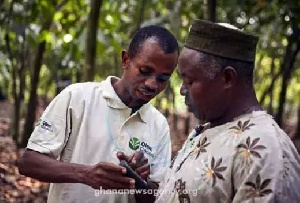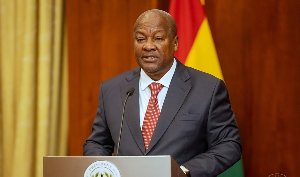Over 14,000 farmers in Ghana are now registered to the Olam Farmer Information System (OFIS), a revolutionary technology which enables mapping and survey of farms, using an Android app to harness data for the benefit of smallholder farmers and cooperatives.
This ‘one stop tech platform’ collects farm-gate data, such as the age of trees, farm infrastructure and weather patterns for analysis which informs ongoing sustainability initiatives, such as Good Agricultural Practice (GAP) and training delivered regularly to small holder farmers.
GAP empowers farmers to optimise on their crop-per-plot yield and by inputting outcomes into the Olam Farmer Information System, progress on farms can be tracked over time and training adapted where necessary. This system ensures the efficient use of resources and helps to increase farmers’ yields and incomes.
In Ghana, the Olam Farmer Information System (OFIS) has gone one step further, providing 332 smallholder farmers with personalised farm management plans. Advice, such as when and how to prune trees or which fertiliser to apply, are all tailored to the individual farm and crop and can be texted straight to the farmer’s mobile phone.
OFIS also builds capacity from the ground up and allows farmer groups and cooperatives in Sefwi-Asawinso and Sefwi Wiawso to manage their stock levels and keep an eye on creditor and debtor positions. It provides detailed reports about their business activities.
Amit Agrawal, Country Head, Olam Ghana, emphasised the platform’s usefulness in helping smallholders, cooperatives and farmer groups when he said:
“While big data usage is commonplace among large-scale farms, the Olam Farmer Information System provides the benefits of ‘big data’ to Ghanaian smallholder farmers and cooperatives. The technology not only supports farmers to increase yields and mitigate against the impact of erratic climatic conditions, but allows farmer groups greater commercial management control.
“The OFIS technology has already been able to survey and record, on the spot, thousands of farms and we are excited to expand this further across the country for the benefit of more farmers and communities.”
The system’s extended coverage of smallholder farmers in Ghana is seen as a significant boost to the Olam Livelihood Charter (OLC), the global initiative which aims to bring prosperity to farming and rural communities by supporting them in various ways, including through providing finance for crop production, investing in training to help improve yields and running rural health programmes.
Now in its seventh year, a sustainability programme will only be awarded OLC status if it addresses all eight of the Charter principles, namely, access to finance; improved yield; good labour practices; market access; traceability; social investment and environmental impact.
In Ghana, the Olam Livelihood Charter covers and supports a total of 31,722 Ghanaian farmers in the cocoa and cashew sectors.
Business News of Tuesday, 5 September 2017
Source: asempanews.com













